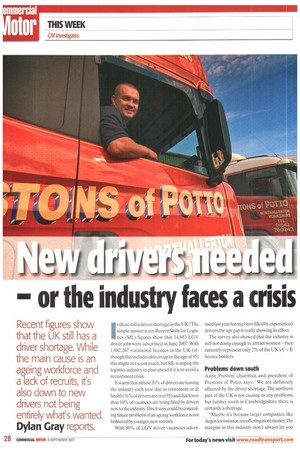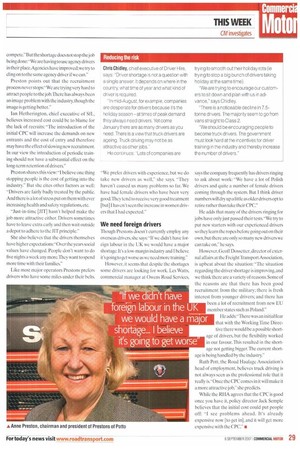or the industry faces a crisis
Page 28

Page 29

If you've noticed an error in this article please click here to report it so we can fix it.
Recent figures show that the UK still has a driver shortage. While the main cause is an ageing workforce and a lack of recruits, is also down to new drivers not being entirely what's wanted.
Dylan Gray reports.
Is there still a driver shortage in the UK? The simple answer is yes, Recent Skills for Logistics (SfL) figures show that 14,853 LGV driver jobs were advertised in June 2007. With 1,882267 vocational licences in the UK (although this includes drivers up to the age of 95) this might not seem much. but Sfl.., is urging the logistics industry to plan ahead if it is to avoid a recruitment crisis.
It warns that almost 20% of drivers are leaving the industry each year due to retirement or ill health (16% of drivers are over 55) and that fewer than 10% of vacancies are being filled by drivers new to the industry:1Es, it says, could he concealing future problems if an ageing workforce is not bolstered by younger, new recruits.
With 80% of LG V driver vacancies adver tised last year having been filled by experienced drivers the age gap is really showing its effect.
The survey also showed that the industry is still not doing enough to attract women — they currently represent only 2% of the UK's C + E licence holders.
Problems down south
Anne Preston, chairman and president of Prestons of Potto, says: "We are definitely affected by the driver shortage. The northern part of the UK is not causing us any problems, but further south in Cambridgeshire there is certainly a shortage.
"Maybe it's because larger companies, like Argos for instance, are offering more money. Die margins in this industry don't always let you compete." But the shortage does not stop the job being done: We are having to use agency drivers in their place.Agencies have improved; we try to cling on to the same agency driver if we can."
Preston points out that the recruitment process never stops: 'We are trying very hard to attract people to the job.There has always been an image problem with the industry, though the image is getting better."
Ian Hetherington, chief executive of SfL, believes increased cost could be to blame for the lack of recruits: "The introduction of the initial CPC will increase the demands on new entrants and the cost of entry and therefore may have the effect of slowing new recruitment. In our view the introduction of periodic training should not have a substantial effect on the long-term retention of drivers" Preston shares this view: believe one thing stopping people is the cost of getting into the industry." But she cites other factors as well: "Drivers are fairly badly treated by the public. And there is a lot of stress put on them \kith ever increasing health and safe ty regulations, etc.
-Just-in-time PIT] hasn't helped make the job more attractive either. Drivers sometimes have to leave extra early and then wait outside a depot to adhere to the JIT principle."
She also believes that the drivers themselves have higher expectations: "Over the years social values have changed. People don't want to do five nights a week any more:They want to spend more time with their families."
Like most major operators Prestons prefers drivers who have some miles under their belts. "We prefer drivers with experience, but we do take new drivers as well," she says. "They haven't caused us many problems so far. We have had female drivers who have been very good.They tend to receive very good treatment [but] I haven't seen the increase in women drivers that I had expected."
We need foreign drivers Though Presions doesn't currently employ any overseas drivers, she says: "If we didn't have foreign labour in the UK we would have a major shortage. It's a low-margin industry and I believe it's going to get worse as we need more training."
However, it seems that despite the shortages some drivers are looking for work. Les Watts, commercial manager at Owens Road Services, says the company frequently has drivers ringing to ask about work: "We have a lot of Polish drivers and quite a number of female drivers coming through the system. But I think driver numbers will dry up a little as older drivers opt to retire rather than take their CPC" He adds that many of the drivers ringing for jobs have only just passed their tests. "We try to put new starters with our experienced drivers so they learn the ropes before going out on their own, but there are only so many new drivers we can take on," he says.
However, Geoff Dossetter. director of external affairs at the Freight Transport Association, is upbeat about the situation: "The situation regarding the driver shortage is improving, and we think there are a variety of reasons. Some of the reasons are that there has been good recruitment from the military; there is fresh interest from younger drivers; and there has been a lot of recruitment from new EU member states such as Poland."
He adds: There was an initial fear that with the Working Time Directive there would be a possible shortage of drivers, but the flexibility worked in our favour. This resulted in the shortage not getting bigger. The current shortage is being handled by the industry."
Ruth Pon, the Road Haulage Association's head of employment, believes truck driving is not always seen as the professional role that it really is. Once the CPC comes in it will make it a more attractive job." she predicts.
While the RHA agrees that the CPC is good once you have it, policy director Jack Semple believes that the initial cost could put people off: "I see problems ahead. it's already expensive now [to get in], and it will get more expensive with the CPC." •
































































































































































































